Understanding HVAC regulations is not just about following rules, they’re crucial for ensuring your home is safe, energy-efficient, and comfortable.
In this article, you’ll learn about the basics of HVAC systems and the specific regulations Maryland homeowners should follow. By the end of this guide, you’ll be well-equipped with the knowledge you need to make sure your home is up to standard.
Let’s get started!
The Importance of HVAC Regulations
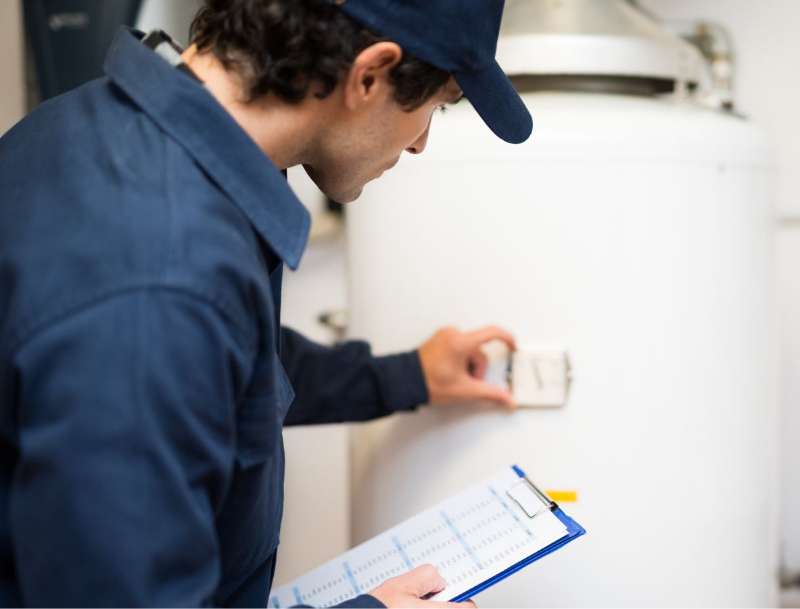
HVAC regulations play a vital role in ensuring homeowners’ and residents’ safety, health, and comfort.
But why are they so important?
Safety and Health
HVAC systems are complex and involve various electrical, mechanical, and chemical components.
If not installed or maintained correctly, these systems can pose significant safety hazards:
- Prevention of Carbon Monoxide Poisoning: Furnaces, if not properly maintained, can leak carbon monoxide, an odorless, colorless, and potentially deadly gas. HVAC regulations, like those enforced by the Centers for Disease Control and Prevention, guide the proper installation and maintenance of these systems to avoid such hazards.
- Electrical Safety: HVAC units are substantial electricity consumers and, if incorrectly installed, can cause electrical shocks or fires. Regulations help ensure proper installation and regular inspection of these systems.
Energy Efficiency and Environmental Impact
HVAC regulations are not just about safety but also sustainability and energy efficiency.
- Energy Efficiency: Efficient HVAC systems utilize less energy, reducing electricity bills and conserving resources. The U.S. Department of Energy’s Energy Star program provides guidelines on energy-efficient HVAC systems, ensuring homeowners can make environmentally-friendly choices.
- Reducing Greenhouse Gas Emissions: By regulating the types of refrigerants used in HVAC systems and promoting energy-efficient models, HVAC regulations contribute to reducing greenhouse gas emissions, significantly mitigating climate change.
Comfort and Home Value
Lastly, HVAC regulations improve the comfort of your home and potentially increase its value:
- Consistent Comfort: Regulations ensure HVAC systems provide uniform heating and cooling across different parts of the home. This contributes to the overall comfort of residents.
- Increased Home Value: Homes with well-maintained, energy-efficient HVAC systems often have higher market values. Compliance with HVAC regulations can be a selling point if you list your home on the market.
Understanding HVAC Systems in Maryland Homes
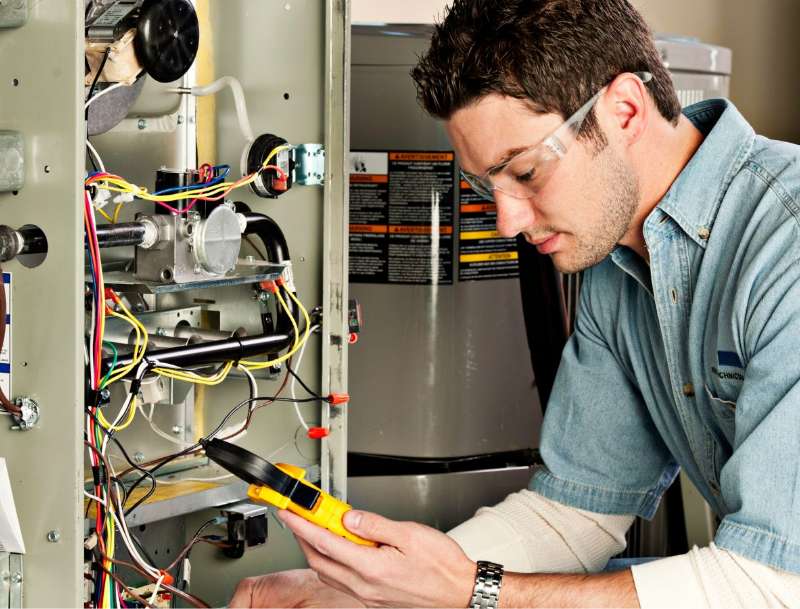
Before diving into the specifics of Maryland HVAC regulations, it’s helpful to understand the types of HVAC systems commonly used in Maryland homes and how they operate. This knowledge will make it easier to comprehend the regulations that govern them.
Common Types of HVAC Systems in Maryland
Given Maryland’s diverse climate, which includes cold winters and hot, humid summers, HVAC systems must provide heating and cooling capabilities.
Here are some of the most common types used in Maryland homes:
- Central Air Conditioners and Heat Pumps: Central air conditioners and heat pumps are widely used because they cool and heat homes. They use ducts to distribute conditioned air throughout the house.
- Furnaces: Furnaces, often powered by natural gas, propane, oil, or electricity, are another popular choice for homeowners in Maryland. They provide heat by blowing heated air through ducts leading to various rooms.
- Boilers: Boilers heat water and circulate the resulting steam or hot water through pipes to radiators, providing heat. They’re a less common but still used method of heating homes in Maryland.
- Ductless Mini-Split Systems: These systems are an efficient choice for homeowners looking for a zoned heating and cooling solution. As the name suggests, ductless mini-split systems do not require ductwork, making them a good fit for homes without existing ducts or for room additions.
Key Components of HVAC Systems
While different HVAC systems have unique characteristics, they all comprise some key components. Understanding these can help you grasp the specifics of HVAC regulations.
- Thermostat: This control unit allows homeowners to set desired temperatures. It signals the system when to turn on and off based on the home’s temperature.
- Furnace: The furnace is the heart of the HVAC system. It heats the air, which is then distributed throughout the house.
- Condensing Unit: Found outside the home for central air conditioners and heat pumps, this unit cools the refrigerant and condenses it from a gas back to a liquid.
- Evaporator Coil: Located inside the house, the evaporator coil converts refrigerant from a liquid to a gas, a process that removes heat from the air.
- Ductwork: Ducts carry cooled or heated air throughout the home.
- Vents: Air enters each room through these outlets.
The Basics of Maryland HVAC Regulations
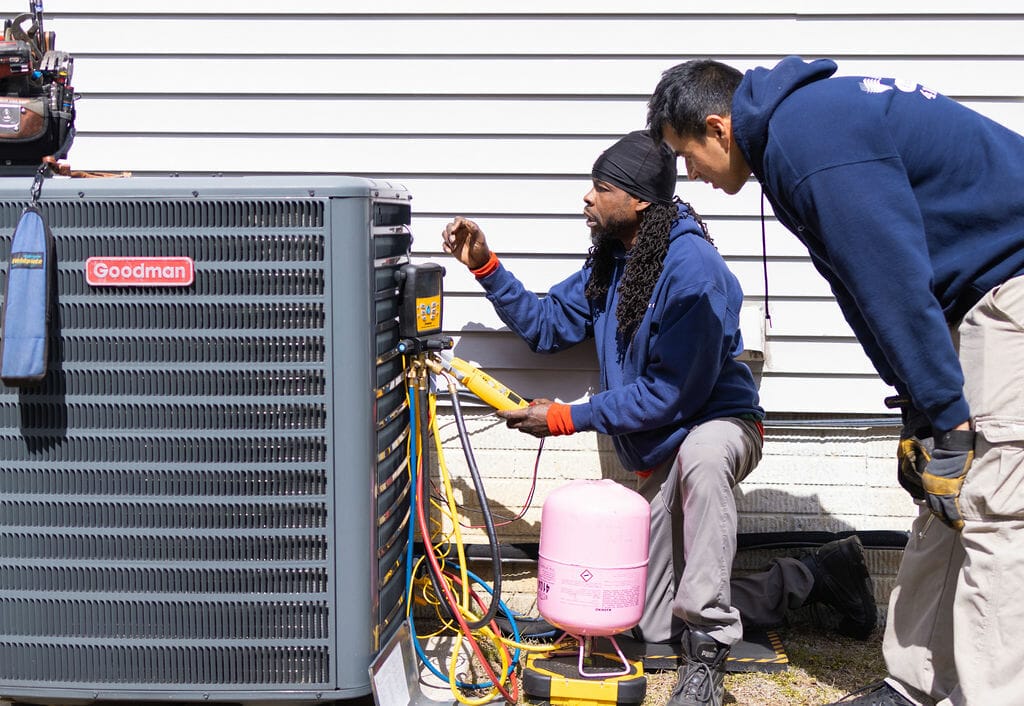
Maryland’s HVAC regulations set the standards for installing, operating, and maintaining HVAC systems in the state. They’re designed to ensure these systems are safe, effective, and energy-efficient.
These are some fundamental aspects of these regulations that every Maryland homeowner should know.
Regulatory Bodies and Applicable Codes
In Maryland, the main regulatory body for HVAC regulations is the Department of Labor’s Division of Labor and Industry. This department enforces codes and standards related to installing, maintaining, and inspecting HVAC systems.
The primary codes used in Maryland are the International Mechanical Code (IMC) and the National Electrical Code (NEC).
- The IMC covers HVAC and refrigeration systems, while the NEC addresses the electrical aspects of these systems.
HVAC Licensing Requirements
In Maryland, any person or company installing, repairing, or maintaining HVAC systems must hold a valid HVACR (Heating, Ventilation, Air Conditioning, and Refrigeration) license from the Maryland Board of Heating, Ventilation, Air Conditioning, and Refrigeration Contractors.
This ensures that all work on HVAC systems is performed by trained and qualified professionals.
Energy Efficiency Standards
Maryland’s HVAC regulations also include requirements for energy efficiency. For example, central air conditioners, heat pumps, and furnaces must meet the minimum Seasonal Energy Efficiency Ratio (SEER), Energy Efficiency Ratio (EER), and Annual Fuel Utilization Efficiency (AFUE) ratings set by the federal government.
The U.S. Department of Energy provides detailed information on these ratings and what they mean for homeowners.
Maryland HVAC Permitting Process
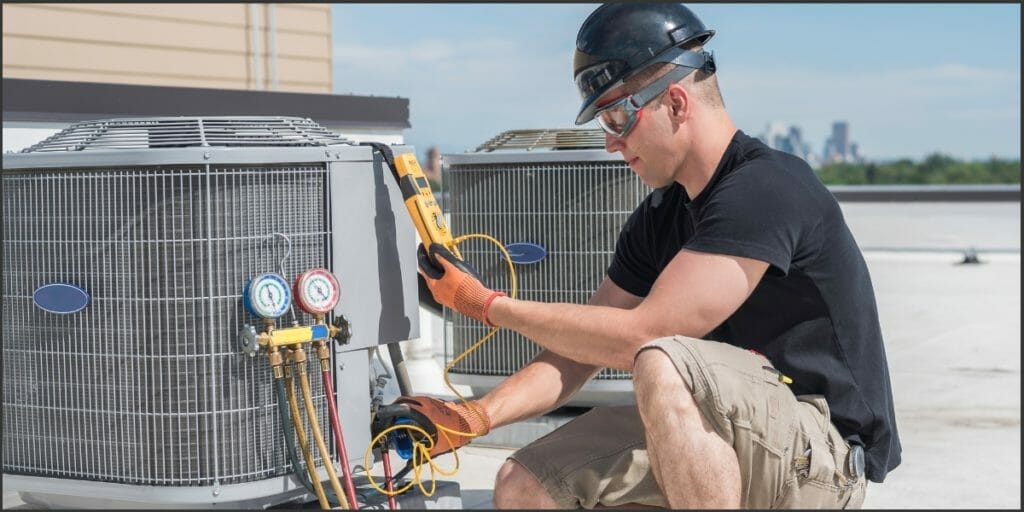
Most HVAC work in Maryland, including new installations and significant system alterations, requires a permit.
HVAC permits are crucial for several reasons:
- Safety Assurance: Permits ensure that the new furnace or air conditioner installation or upgrade adheres to the safety standards established by local and state codes.
- Quality Control: The permitting process includes inspections that verify the work has been performed correctly and up to the established quality standards.
- Value Protection: For homeowners considering selling their property in the future, having the proper permits for HVAC work can affirm to potential buyers that all modifications and installations are up to code.
When is a Permit Required?
Permits are generally required for new HVAC system installations and significant system alterations. This includes, but is not limited to:
- Installing a new HVAC system
- Replacing an existing HVAC unit
- Making significant changes to the existing ductwork
- Changing the type of HVAC system (for example, switching from a furnace to a heat pump)
Minor repairs or routine maintenance typically do not require a permit, but homeowners should always check with their local authorities to be certain.
How to Apply for a Permit
The process to apply for an HVAC permit can vary from county to county in Maryland. However, the general steps are as follows:
- Submit an application: This usually involves filling out a form with details about the work. Some counties provide these forms online.
- Pay the fee: There is typically a fee associated with the permit, which can vary depending on the scope of the work.
- Wait for approval: The review process can take anywhere from a few days to weeks, depending on the county and the project’s complexity.
- Schedule inspections: After completing the work, an inspection is usually required to confirm that it meets all applicable codes and standards.
Working with a licensed HVAC contractor can help ensure the permitting process is handled correctly. These professionals are familiar with local codes and can help navigate the process, ensuring your HVAC project is compliant and up to standard.
HVAC Installation and Replacement Regulations
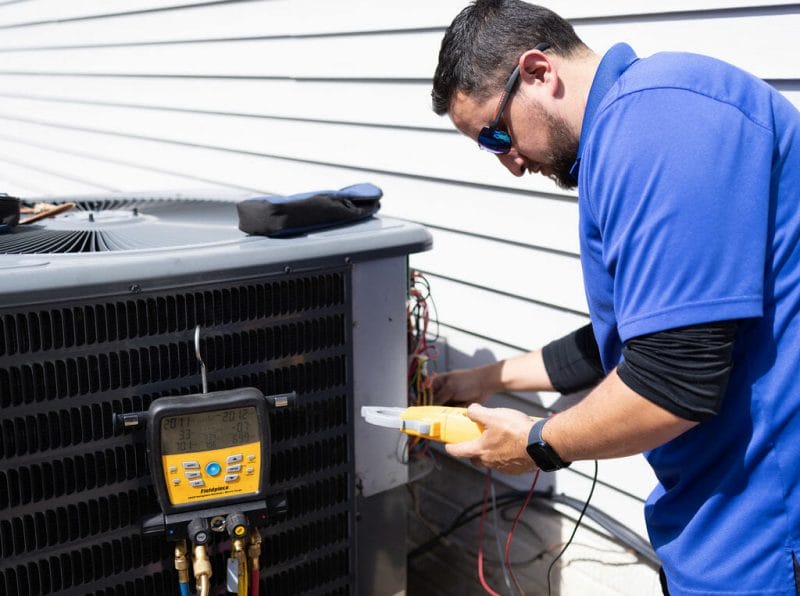
Equipment Selection
Selecting the right equipment is not only about comfort but also about compliance with energy efficiency standards. As per Maryland HVAC regulations:
- Energy Efficiency: HVAC equipment must meet the minimum SEER, EER, and AFUE ratings the federal government sets.
- Refrigerants: HVAC equipment must use approved refrigerants that are environmentally safe.
Installation Process
The installation process must adhere to the safety and quality standards outlined in the International Mechanical Code (IMC) and the National Electrical Code (NEC).
- Ductwork: The IMC provides guidelines on properly sizing and sealing ducts. Poorly sized or sealed ducts can lead to inefficiency and uneven heating or cooling.
- Ventilation: Adequate ventilation is necessary for safe and efficient operation. The IMC contains guidelines on the required ventilation for HVAC systems.
- Electrical Connections: All electrical connections must comply with the NEC to prevent fire hazards and electrical shock.
Maryland HVAC Maintenance Regulations
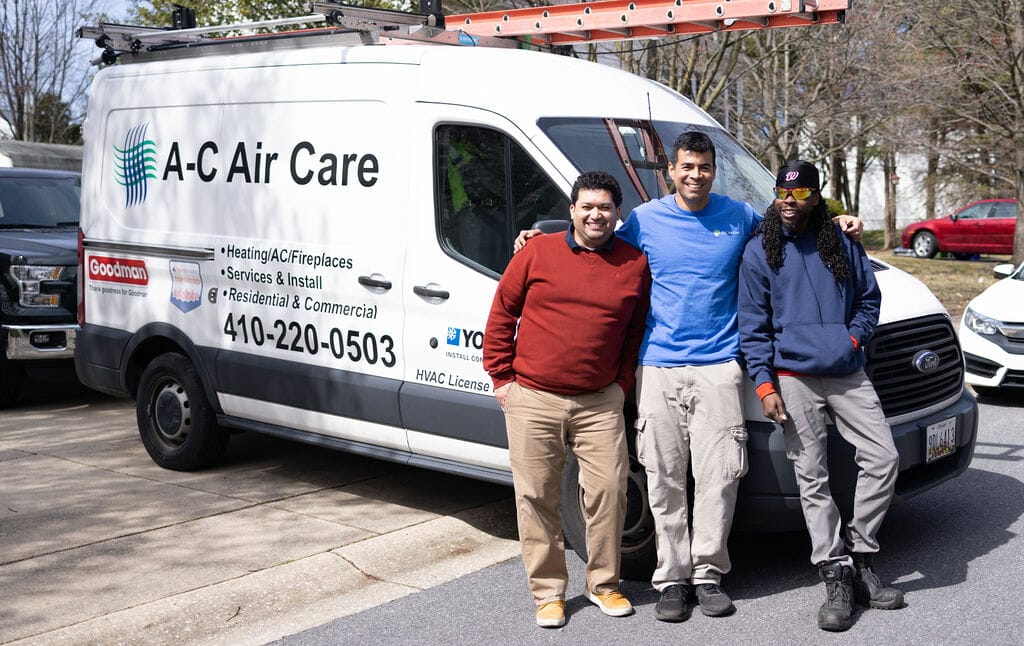
Recommended Maintenance Practices
- Regular Filter Changes: Changing the air filters on a regular schedule can significantly improve your HVAC system’s efficiency and the air quality in your home. Depending on the system and the filter type, this must be done every 30-90 days.
- Annual Professional Inspections: Having your HVAC system inspected by a licensed professional annually helps detect and prevent potential issues. These inspections often include cleaning and servicing critical components to ensure efficient operation.
- Ductwork Inspection and Cleaning: Ductwork can accumulate dust and debris over time, impacting the system’s efficiency. Regular inspection and cleaning by a professional can maintain the performance of your HVAC system.
Professional Maintenance Requirements
While homeowners can perform some maintenance tasks, licensed professionals must carry out certain tasks to maintain system safety, efficiency, and warranty compliance. These tasks include, but are not limited to:
- System Servicing: Regular servicing, which includes checking refrigerant levels, inspecting and cleaning coils, and checking the system’s overall operation, must be performed by a licensed professional.
- Repairs: A licensed professional should carry out any significant repair work. Not only is this necessary for safety, but it also ensures the repairs are done correctly and maintains the validity of any existing warranties.
Take note that any significant maintenance tasks, such as those that may alter the system or its operation, may require a permit and must adhere to Maryland HVAC regulations.
HVAC Energy Efficiency Regulations in Maryland
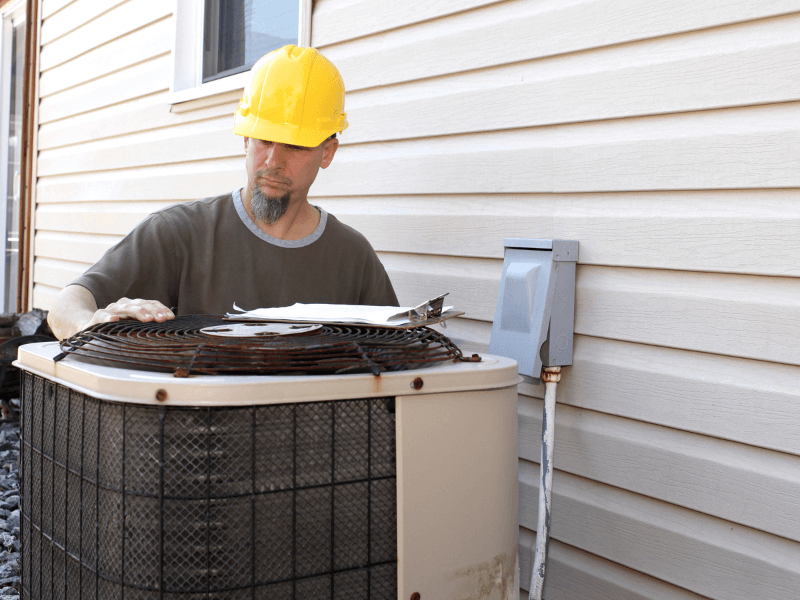
Energy efficiency is at the heart of Maryland’s HVAC regulations. Adhering to these standards can significantly reduce energy consumption, lower utility bills, and lessen your environmental impact.
Federal Energy Efficiency Standards
Maryland follows the federal government’s energy efficiency standards for HVAC equipment. This includes the Seasonal Energy Efficiency Ratio (SEER) for air conditioners and heat pumps and the Annual Fuel Utilization Efficiency (AFUE) for furnaces.
These standards set the minimum efficiency levels for HVAC equipment:
- SEER: The minimum SEER rating for new air conditioners is 13 or 14, depending on the region.
- AFUE: The minimum AFUE rating for new furnaces is 80%.
Equipment Sizing
Proper sizing of HVAC equipment is crucial for energy efficiency. An oversized or undersized system can lead to increased energy use, uneven temperature control, and reduced equipment lifespan.
HVAC contractors use Manual J Load Calculation to correctly size HVAC systems based on home size, insulation levels, and local climate.
Proper Installation
Proper installation of HVAC equipment is critical for ensuring energy efficiency. This includes correct placement and sealing of ductwork and adequate insulation.
Maintenance and Energy Efficiency
Regular maintenance is crucial in maintaining an HVAC system’s energy efficiency over its lifespan. Tasks like replacing air filters, cleaning coils, and regularly checking system operation can keep your HVAC system running at its peak efficiency.
Common Mistakes with HVAC Regulations and How to Choose the Right Professional
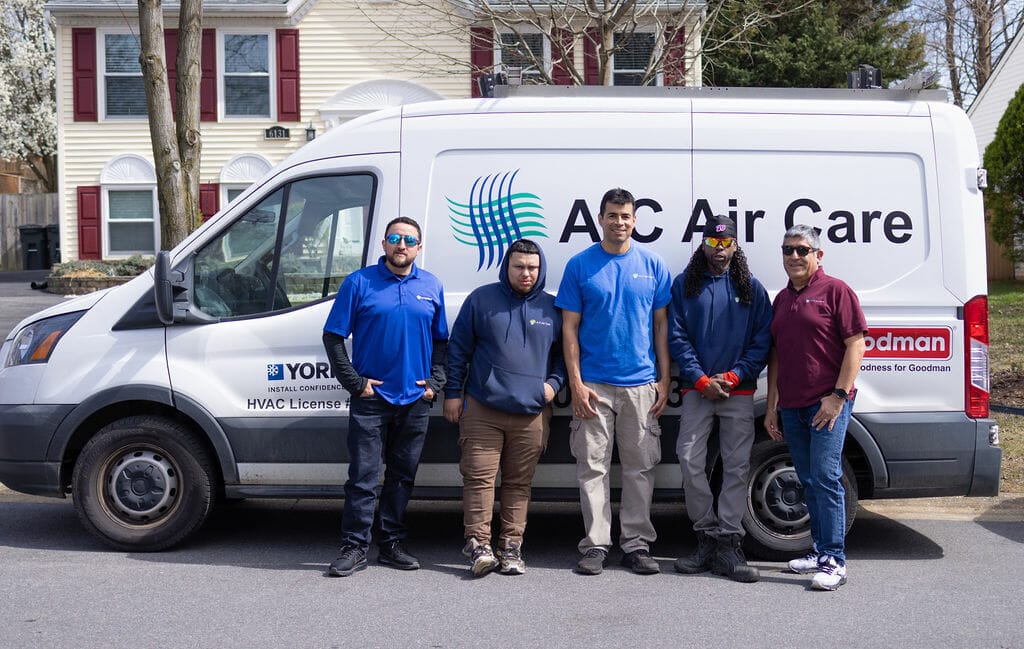
When navigating HVAC regulations in Maryland, homeowners can sometimes make common mistakes that could lead to future problems.
On the flip side, knowing how to choose the right professional can simplify the process and ensure the HVAC system remains safe, efficient, and compliant.
Common Mistakes Maryland Homeowners Make
Below are some of the common missteps that Maryland homeowners make regarding HVAC regulations:
- Ignoring Permit Requirements: Whether it’s a new installation, significant alteration, or sometimes even repair work, permits are often required. Failing to obtain these permits can result in penalties and might create issues when selling your home.
- Improper HVAC Sizing: Incorrect sizing leads to inefficiencies, higher energy bills, and reduced equipment lifespan. Proper HVAC sizing requires consideration of various factors, including insulation, window size, and regional climate.
- Unqualified Installation or Maintenance: Improper installation or maintenance results in system damage, reduced efficiency, safety risks, and voided warranties.
- Neglecting Regular Maintenance: Skipping regular maintenance leads to decreased performance and unexpected system breakdowns.
- Overlooking Energy Efficiency Standards: Purchasing HVAC equipment without considering energy efficiency standards can lead to higher energy bills and potential non-compliance issues.
Avoiding these common mistakes can help homeowners adhere to Maryland’s HVAC regulations, extend the lifespan of their HVAC systems, and keep their homes comfortable and efficient.
How to Choose the Right Professional
When it comes to HVAC work, hiring a licensed professional HVAC contractor can ensure that all work meets state and local regulations and is done safely and correctly. Here’s what homeowners should consider when choosing a professional:
- Licensing: In Maryland, HVAC contractors in Catonsville or anywhere in Maryland should be licensed by the Maryland Board of Heating, Ventilation, Air Conditioning, and Refrigeration Contractors. You can verify a contractor’s license on their website.
- Experience: Look for contractors with substantial experience, especially with your specific type of HVAC system.
- References: Reliable contractors should be able to provide references from past customers.
- Estimates: Get multiple estimates before deciding on a contractor. Keep in mind that the lowest bid isn’t always the best. Quality and service are important factors to consider.
Additional Resources
Plenty of resources are available for those looking to delve deeper into the world of HVAC regulations, energy efficiency, and best practices. Here’s a list of recommended readings and references that will provide valuable insights:
For Maryland HVAC Regulations:
- Maryland Department of Labor’s Division of Labor and Industry: A comprehensive source for all Maryland-specific HVAC regulations, license requirements, and more. Visit their site here.
- Montgomery County Department of Permitting Services: Provides an overview of permit requirements for HVAC work in Montgomery County. Click here to learn more.
For Federal HVAC Standards:
- U.S. Department of Energy: A hub for all information related to energy efficiency, including HVAC systems. Their guide to residential central air conditioning is especially useful and can be found here.
- Energy Star: This U.S. Environmental Protection Agency program provides guidelines for energy-efficient products, including HVAC systems. Explore Energy Star-rated HVAC products here.
For General HVAC Knowledge:
- North American Technician Excellence (NATE): NATE offers consumer resources, including a blog with numerous HVAC-related articles. Check out their website.
- Air Conditioning Contractors of America (ACCA): ACCA provides many resources for HVAC professionals and homeowners alike. Find it here.
Wrapping Up
Adhering to HVAC regulations may seem like a chore, but it’s a key part of responsible homeownership. Moreover, with the right knowledge and resources, it’s an entirely achievable goal.
Remember, while some tasks can be handled independently, many HVAC installation and maintenance aspects are best left to licensed professionals. This ensures quality work, compliance with regulations, safety, and the maintenance of existing warranties.
Plus, professionals can help you navigate complex regulations, making the process less stressful and more efficient.


